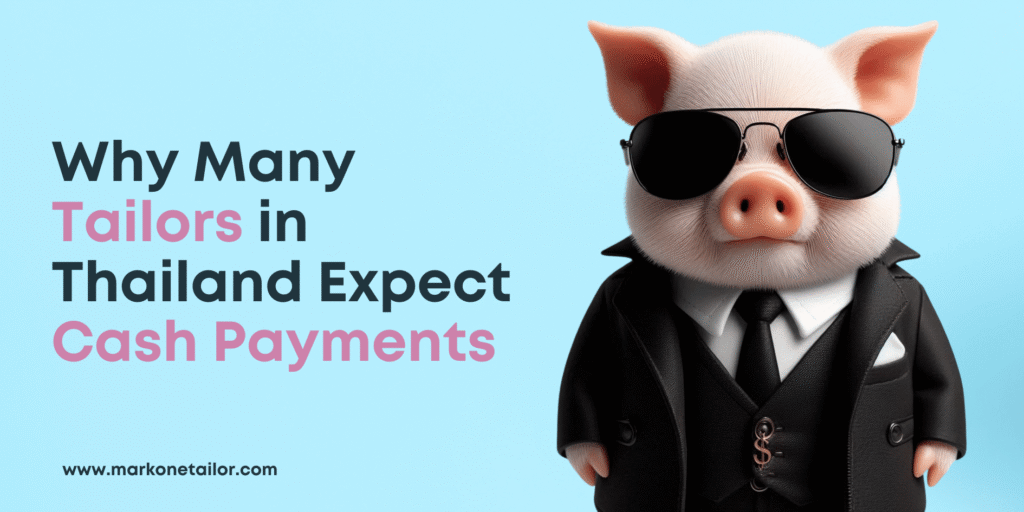Planning a trip to Thailand and dreaming of getting a custom-made suit? You’re not alone. Thailand has long been a popular destination for tourists seeking high-quality, affordable tailoring services. However, many visitors are surprised when they discover that most tailors expect payment in cash rather than accepting credit cards.
If you’ve ever wondered why cash is king in Thailand’s tailoring industry, the answer isn’t as simple as you might think. While many tourists assume that cash payments are just part of Thai culture, the real reason runs much deeper. It’s a story that involves banking regulations, past scams, and protective measures that have shaped the industry for decades.
Understanding this background can help you navigate Thailand’s tailoring scene more effectively and avoid potential pitfalls during your shopping experience.

The Banking Restriction Reality
Thai banks have historically been reluctant to provide credit card processing services to tailors. This isn’t a coincidence or a simple business preference—it’s a deliberate policy that stems from significant problems the industry faced in the past.
Most legitimate tailors find themselves unable to obtain credit card machines from major Thai banks. The banks view the tailoring industry as high-risk due to previous incidents involving fraudulent practices and customer disputes. This classification makes it extremely difficult for even honest tailors to access standard payment processing services.
The restriction affects both small independent tailors and larger shops throughout the country. From the bustling streets of Bangkok to the tourist areas of Khao Lak, cash payments have become the norm rather than the exception.
The Dark History of Thai Tailor Scams
To understand why banks impose these restrictions, we need to examine the troubling history of tailor scams that plagued Thailand’s tourism industry.
How the Scams Worked
About 15 years ago, Thailand experienced a wave of tailor scams that specifically targeted Western tourists. These operations were sophisticated and devastating for unsuspecting visitors.
Here’s how a typical scam unfolded:
A tourist would visit a tailor shop, often after being brought there by a tuk-tuk driver who received a commission for the referral. The tailor would quote an extremely inflated price for their services. For example, a suit that should reasonably cost around 12,000 THB would be priced at 70,000 THB or more.
The scammer would use high-pressure sales tactics, claiming special deals or limited-time offers. Once the customer agreed to the purchase, the tailor would demand full payment upfront—a red flag that many tourists unfortunately ignored.
The Credit Card Trap
Since most tourists didn’t carry large amounts of cash, they would use their credit cards to make these substantial payments. The scammers had perfected a system to protect themselves legally.
During the credit card transaction, the tailor would ask the customer to sign twice and write a statement declaring something like “I am paying willingly and was not forced.” This documentation became crucial evidence later.
When customers returned for fittings, they often realized they had been grossly overcharged. However, by this point, it was too late to easily reverse the transaction.
Why Banks Couldn’t Help
Victims who tried to contest these charges through their banks, embassies, or local police found themselves in a difficult position. The Thai banking system operates under strict regulations, and once a payment is signed and authorized, banks cannot simply cancel it.
The signed statements and documented consent made it nearly impossible for banks to classify these transactions as fraudulent, even when the pricing was clearly excessive. From a legal standpoint, the customers had agreed to the terms and prices, making chargebacks extremely difficult to process.
The Tuk-Tuk Driver Connection
Many tourists never realized that their troubles often began with their transportation choices. Tuk-tuk drivers frequently played a role in these scams by steering tourists toward dishonest tailors.
These drivers received commissions for bringing customers to specific shops, creating a financial incentive to direct tourists to establishments that might not have their best interests at heart. The practice was so widespread that it became a significant factor in the overall scam ecosystem.
Modern Changes and Lingering Effects
The landscape has evolved significantly since the peak of these scams. Social media and online review platforms have made it much easier for tourists to share their experiences and warn others about problematic businesses.
Today, scam tailors are less common, particularly because negative reviews can quickly spread across platforms like TripAdvisor, Google Reviews, and Facebook. The power of online reputation management has created natural consequences for businesses that engage in deceptive practices.
However, the banking restrictions implemented as a protective measure remain largely in place. Banks continue to view the tailoring industry with caution, making it challenging for legitimate businesses to offer convenient payment options to their customers.
Finding Trustworthy Tailors
Not all tailors in Thailand operate under these restrictions. Some established businesses have managed to maintain good relationships with banks and can accept credit cards.
Mark One Tailor, for example, accepts all kinds of credit cards and operates as a legitimate business that doesn’t engage in the scam practices that plagued the industry. They don’t charge extra money to customers to pay commissions to third parties, distinguishing themselves from the problematic operators of the past.
When searching for a reputable tailor, look for businesses that:
- Accept multiple payment methods
- Have strong online reviews and ratings
- Provide transparent pricing upfront
- Don’t pressure you into immediate decisions
- Are recommended by reliable sources rather than commission-driven tuk-tuk drivers
Protecting Yourself as a Tourist
Understanding why many tailors expect cash payments can help you make informed decisions during your visit to Thailand.
Research Before You Go
Spend time researching tailors online before your trip. Look for businesses with consistently positive reviews and transparent business practices. Avoid shops that have numerous complaints about overcharging or poor service.
Be Wary of Unsolicited Recommendations
If a tuk-tuk driver or street vendor enthusiastically recommends a specific tailor, approach with caution. While not all such recommendations are problematic, many tourists have found themselves in difficult situations by following these suggestions.
Ask About Payment Methods
Don’t hesitate to ask about payment options upfront. Legitimate businesses will be transparent about their payment policies and won’t pressure you into any specific method.
Trust Your Instincts
If something feels wrong about a pricing quote or business practice, trust your instincts and consider looking elsewhere. Thailand has many skilled tailors, so you don’t need to settle for a situation that makes you uncomfortable.
The Path Forward for Thailand’s Tailoring Industry
The cash payment expectation in Thailand’s tailoring industry reflects a complex history of fraud, regulation, and consumer protection. While the restrictions may seem inconvenient for tourists, they represent the banking sector’s attempt to prevent the widespread scams that once plagued the industry.
As the industry continues to evolve and legitimate businesses work to rebuild trust, we may see gradual changes in banking policies. However, for now, being prepared with cash or seeking out the few tailors who can accept credit cards remains the practical approach for most tourists.
Understanding this background helps explain why your dream suit might require a trip to the ATM—and why that requirement might actually be a sign of an industry working to protect both businesses and consumers from the problems of the past.
Note: This content is compiled from publicly available online sources. We have no intention to target or single out any individual tailor, tailoring business, or Tuk Tuk operator.

